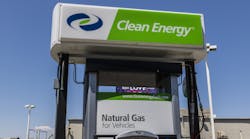It's widely understood that fuels other than diesel are now an integral part of achieving immediate gains in lowering carbon emissions and also the long-term goal of a net-zero carbon transportation system. However, we need to expand the definition of alternative fuels to include more than battery-electric and hydrogen fuel cells because these options are not readily available to everyone, nor do the performance characteristics of these vehicles meet the specific needs of many fleets that are engaged in a labyrinth of applications and vocations.
In many cases, these objectives may never be obtainable.
In addition, many current studies are showing that truck users are, in fact, unable to adapt to the electric and fuel-cell technologies without making major, costly adjustments. Some prohibitive. So, here again, they are going to look for alternative solutions that fit their current and future needs.
That’s why fuel sources such as compressed natural gas (CNG), renewable natural gas (RNG), methanol, ethanol, renewable diesel, hydrogen-based fuels, and others can very much assist the commercial vehicle industry in affecting its environmental goals. What’s even more significant when a vehicle’s full life cycle is considered is that in many circumstances, these alternatives can even achieve a total lower carbon footprint than a battery-electric vehicle.
See also: ‘Clean’ trucking is here to stay
These fuels are going to serve as a bridge for providing emissions improvements because existing engine designs can either run these fuels now or can be easily converted to run on them in the near future.
RNG and renewable diesel (RD) are the fuels at the forefront of this initiative, as they can be used as drop-in replacements for natural gas and diesel fuels while also providing immediate carbon reductions. These fuels also can be used in blends with exiting fossil fuels to improve the emissions of today’s vehicles while the production of these renewable fuels can grow over time.
Hydrogen, ethanol, and methanol are other alternatives that can be used to lower total emissions. They are great alternatives that will allow for diversification away from fossil fuels. Engines that consume these fuels have been demonstrated, and many are already on the road. Technology leaders around the world are continuing to improve these engines and are discovering technologies that will make these engines operate even more efficiently.
It's through the extensive testing of virtually all diesel engines made throughout the world that we are finding that variable valve actuation (VVA) can best accomplish all these diverse goals.
VVA works by managing airflow for all tightly controlled combustion strategies by making changes in the intake and exhaust valve timing to either make these events longer or shorter. That changes the air intake going into the combustion cylinder and the exhaust coming out. These needs vary based on speed and load and can be precisely adjusted to maximize engine performance, as well as promote cleaner exhaust, and provide important exhaust thermal management that enables the aftertreatment system to operate at peak efficiency. All the strategies are key to meeting future ultra-low emissions and carbon reduction goals.
Since alternative fuels can provide a low- to zero-carbon future, they should be an important piece of any commercial vehicle fleet looking to promote sustainability, especially for fleets that like the performance of their current internal combustion engines.
See also: Cummins CEO: Zero-emission future can be profitable for trucking
While there is a great deal of government funding and other incentives going into BEVs and hydrogen fuel cells, and justifiably so, there also needs to be a similar amount of funds for alternative fuels so fleets can begin to bring about the environmental benefits as soon as possible. Many of these fuels are available now for the taking.
The key today, therefore, is to establish increased awareness of these important facts and encourage as many decision-makers as possible to advocate and look into the advantages that these alternative fuels have to offer.
The eggs have been laid and the time has come for the chickens to exit their shells.
When that is accomplished, and with advanced technology like variable valve actuation and others, trucks in the future will not only be operating cleaner but also remarkably similar to how they are operating today.




